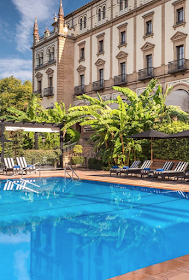The only concert hall in the world to be declared a UNESCO World Heritage Site, the Palau de la Música in Barcelona was designed by the architect Domènech i Montaner as the home of the Orfeó Català choir. Funded by public donations, the Palau de la Música is one of the most iconic examples of Catalonia's architectural and musical heritage, and the only concert hall of it’s kind, mixing glass, ceramics and stone arts in a perfect marriage between Music and Architecture. There’s a master behind every genius, and there would be no Gaudí without the talented Lluis Domènech i Montaner, hailed as the most modern of the modernists, notably for his mastery of lightweight steel construction. A magnificent example of the Catalan modernist style, with a design that presents an abundance of curved lines and dynamic shapes, as well as a sumptuous decoration that uses a number of nature-related motifs, the Palau may be one of the most truly Catalan buildings there are in the city due to the fact that there was an express request made to the architect that he use materials and techniques that represented the Catalan character. To make sure that he fulfilled this request, Montaner gave much creative freedom to the craftsmen and artisans who were carving the famous and detailed façade and interior of the building, thus providing a unique Catalan profile associated with the building.
The façade itself is one of the most stunning parts of the building, combining elements of both Spanish and Arabic architecture, being richly decorated, and mixing exposed brick with mosaics, iron, stained glass and glazed tiles. Inside, the breathtaking concert hall is dominated by an enormous organ over the stage crowned with a spectacular stained glass skylight portraying the sun, the hall is an overwhelming explosion of colour. A mystical, paradoxical space, with figures representing the muses which surround the stage, a bust of Anselm Clavé on one side and Beethoven on the other, and natural motifs, including flowers, palms or fruits, the Palau de la Música is one of the most beautiful concert halls in the world and represents an essential landmark in the cultural and social life of Catalonia. Many famous soloists, directors, composers and orchestras have been performing in the beautiful main hall of the Palau including Maurice Ravel, Igor Stravinsky, Richard Strauss, Herbert Von Karajan, Duke Ellington, Ella Fitzgerald and Woody Allen, to name few.
Wonderful glazed ceramic flowers on the exposed brick columns and arches of the foyer
in keeping with the architects tribute to nature
The Café foyer where we met for our guided tour of the Palau
Glazed ceramic flowers and tiles are found throughout the building
The rehearsal hall for the Orfeó Català choir and gathering point for guided tours with an introductory film on the history of the Palau de la Música
One of the most beautiful concert halls in the world, the Palau de la Música is an architectural jewel and the only concert venue in this style to be listed as a UNESCO World Heritage Site
The ceiling is an inverted bell of stained glass depicting the sun bursting out of a blue sky
and designed by Antoni Rigalt
The exquisite interior with famed pipe organ built by the prestigious German firm Walcker in Ludwigsburg, which we were able to hear during a private concert during our tour
Bust of Anselm Clavé, a famous choir director who was instrumental in reviving Catalan folk songs
Closeup of the carved arch with young ladies singing a traditional Catalan song
One of18 half-mosaic, half-relief Muses appear out of the back of the stage,
representing the styles of music, sculpted by Eusebi Arnau and mosaics by Lluís Bru
Stained glass window of the cross of St Jordi (St George), the patron saint of Catalonia
The outdoor balcony of the Palau de la Música with gorgeous columns
symbolizing a garden of flowers
The façade is one of the most stunning parts of the building, combining elements of both Spanish and Arabic architecture, richly decorated and mixing exposed brick with mosaics and glazed tiles
Handcrafted mosaic columns of the exterior loggia with floral motifs and winding leaves
The Palau de la Música is a glorious culmination of the work of local Catalan artisans and craftsmen





































































